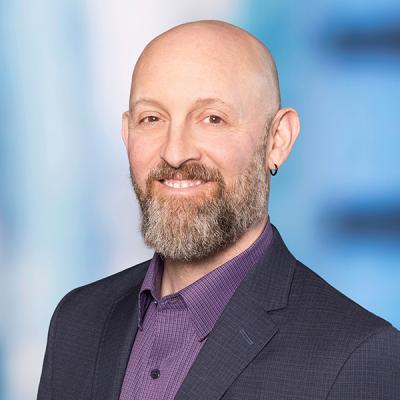MintzTech Connect Industry News — Q&A with RLab
1. How did RLab start?
RLab started as a partnership between New York City and its universities to turn the city into a global leader for virtual reality, augmented reality, and related technologies. Innovation in VR and AR has the potential to impact a lot of the industries that make up New York City’s economy — from media and entertainment to health care and manufacturing. RLab was founded to spur corporate innovation, support entrepreneurs and startups, and build a talent pipeline for future jobs.
2. What are some of RLab’s goals for its new Brooklyn Navy Yard facility?
We have big plans for RLab’s facility, which includes 16,500 square feet of classrooms, coworking spaces, motion capture studios, and more in Building 22 in the Brooklyn Navy Yard. Most RLab programming will take place in this space, including professional development and executive education courses, startup accelerators, and corporate convenings and innovation tours. But RLab will also host community events, meetups, and partner or sponsored events in this space, as well as recurring open houses that will expose more New Yorkers to all the exciting developments in immersive tech.
3. What does RLab look for in the startups that it works with?
We’re looking for startups for two new venture programs launching in September 2019. With the RLab Accelerator, supported by Super Ventures, we want to bring the best early-stage VR/AR startups from around the world to NYC where they can access the expertise, capital, and partnerships they need to take their business to the next stage. For our incubator program, the RLab Bootcamp, we’re searching for teams of faculty or students from any university in New York City who have a product idea that they want to validate and turn into a business. For both programs, we’re looking for big ideas and passionate team members that are pushing the boundaries of VR/AR across industries.
4. How does RLab view and support the connection between art and technology?
NYC has the potential to be a global leader in VR/AR in no small part because of the world-class community of artists, designers, composers, and other creators who call this city home. Designing immersive experiences requires talent of multiple disciplines, and RLab’s vision is to build a community that reflects the diversity of our city’s creative community, and spurs connections across industries that create new jobs and opportunities for New Yorkers.
5. What exciting milestones has RLab achieved recently?
Since our doors opened in October 2018, we have been ramping our activities and our community is growing. We’re looking forward to kicking off our venture programs in fall 2019, after a successful pilot with 12 startups in winter/spring 2019. We have a full calendar of education programs — including master classes, executive education, and community workshops. To date, nearly 1,200 people have participated in more than 20 classes, workshops, and exhibitions at RLab, and over 325 developers attended nearly monthly hackathons, jams, or other events. We’ve also seen a lot of interest in our corporate innovation programs —– three major corporate events drew over 200 executives, and we’re busy planning a slate of convenings and other activities in several verticals, including health care and heavy industry.
6. How is RLab leveraging its relationships with New York City universities like NYU Tandon School of Engineering, Columbia, CUNY, and the New School?
RLab’s mission is to leverage the talent, research, and expertise from New York City’s universities to generate economic growth and new jobs, and we’re approaching this in several ways. Our new venture programs help commercialize ideas and technologies that emerge from universities. Our education programs are taught by faculty from across a consortium of university partners. Many of our university partners also have their own programs and initiatives around VR and AR, so RLab helps connect the work that is happening in pockets around the city. For example, the Virtual Reality Training Academy & Development Lab at CUNY Lehman College has a full calendar of classes, workshops, and events that are open to the public, and geared towards small businesses and entrepreneurs, while CUNY’s Craig Newmark Graduate School of Journalism has an Emerging Tech Lab that equips journalists to experiment with immersive storytelling.
7. How does RLab engage with its local communities in Brooklyn and New York City?
Even though renovations are still in progress, RLab has been hosting nearly weekly events and tech meetups that have drawn hundreds of visitors to the Brooklyn Navy Yard. Once construction is complete, we plan on hosting monthly open houses for anyone curious enough to come by — with the goal of providing opportunities for more New Yorkers to learn about the latest tech and get inspired about future interfaces. As our community grows, we’re thinking a lot about how best to leverage our strengths in service of our neighbors’ needs, and we hope to connect our community to local service opportunities and social impact initiatives in the city.
8. What kinds of projects is RLab most excited for in the next year?
In June, we hosted our first convening around digital innovation in the health care, medicine, and wellness space. The event was a success, and we see a need for more convenings that bring together technologists, business leaders, and experts or practitioners to co-design an agenda for collaboration and identify use cases and potential applications of tech to solve problems. We’re excited to continue bringing people together, and we’re planning a full slate of events, convenings, and campaigns across several key focus areas — including health, heavy industry, media, and social impact. To receive updates about events as they are announced, sign up for our newsletter at www.rlab.nyc.




